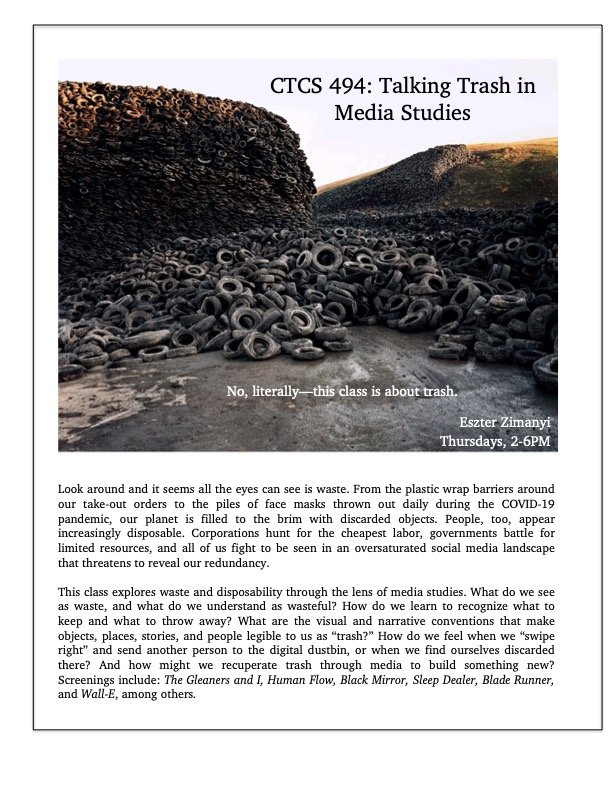“The exilic intellectual does not respond to the logic of the conventional but to the audacity of daring, and to representing change, to moving on, not standing still” - Edward Said
These words have resonated with me since I first encountered them as an undergraduate student and they continue to influence my approach to research and teaching. As an immigrant scholar working on the intersections of migration, displacement, and media, I aim to unsettle my students’ assumptions about the world and their placement in it—as well as my own—in order to move us collectively toward discovering the world anew.
Selected Teaching Experience
Talking Trash: Media Cultures of Waste and Disposability
Spring 2022 // University of Southern California
Course Description: Look around and it seems all the eyes can see is waste. From the plastic wrap barriers around our take-out orders to the piles of face masks thrown out daily during the COVID-19 pandemic, our planet is filled to the brim with discarded objects. People, too, appear increasingly disposable. Corporations hunt for the cheapest labor, governments battle for limited resources, and all of us fight to be seen in an oversaturated social media landscape that threatens to reveal our redundancy. This class explores waste and disposability through the lens of media studies and will address a wide range of themes, including but not limited to: climate change, migration, mental health, labor, disease and disability, social inequality, digital communication, and interpersonal relationships. What do we see as waste, and what do we understand as wasteful? How do we learn to recognize what to keep and what to throw away? What are the visual and narrative conventions that make objects, places, stories, and people legible to us as “trash?” How do we feel when we “swipe left” and send another person to the digital dustbin, or when we find ourselves discarded there? And how might we recuperate trash through media to build something new?
Screenings include: The Gleaners and I, Human Flow, Black Mirror, Blade Runner, and Wall-E, among others.
Radical Media
Fall 2021 // University of Southern California
Course Description: What does it mean to be radical? What role does media play in fostering—and helping us understand—radical movements? This class will examine the aesthetic, thematic, political and commercial imperatives that have driven socially engaged media practices over the past century. We will learn about the social, historical and institutional contexts that made, and continue to make, radical media a necessary component of sociopolitical movements around the globe. These media practices range in form, from documentary films, to the experimental and avant-garde, to orchestrated social media campaigns and the unpredictability of viral, live-streamed videos. We will consider the role of media within social movements across continents and contexts, from the 1950s to present, and explore how media mobilizes political action, challenges dominant ideologies and historical narratives, and helps us imagine different futures.
Screenings include: The Hour of the Furnaces, The Battle of Algiers, The Infiltrators, Blue, Kanehsatake: 270 Years of Resistance, and Midnight Traveler, among others.
Invited Guest Lectures
I have been invited to give guest lectures on topics related to my research in both undergraduate and graduate seminars at numerous universities, including Brown University; New York University; University of Wisconsin-Madison; University of Washington, Bothell; University of Texas at Dallas; Loyola Marymount University, Los Angeles; University of California, Irvine; and University of Southern California. If you are interested in booking me as a speaker in your course, please reach out via the Contact page on this website.

